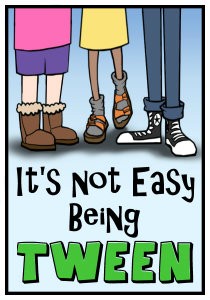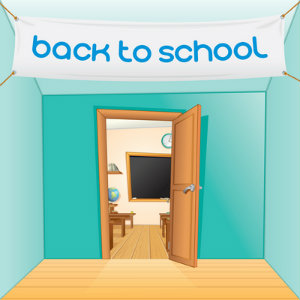The 7 Questions Your Middle School Students Ask First
A MiddleWeb Blog

If you’re a new teacher, or new to teaching in middle school, I don’t mean to make you anxious. I’m here to help. How can you make the first day a great day?
As with everything I do in my classroom, I give my first day plans my two-question litmus test:
(1) Would I want to be a student in my classroom?
(2) Am I putting the needs of the students first?
Over the years, I have tried many different first day routines. I even second-guessed everything I had been doing for a decade when I first read Harry and Rosemary Wong’s book The First Days of School: How to Be an Effective Teacher.
I soon adopted most of their strategies, thinking that was the right thing to do. I have since abandoned their suggestions that do not work with my teaching style, but what has stuck with me are the Seven Questions they introduced.
The first 7 questions your students need answered
The Wongs’ seven questions come from a 1985 article by Douglas Brooks called The First Day of School.

- Are they in the right room?
- Where are they supposed to sit?
- What are the rules of this teacher?
- What will they be doing in this course?
- How will they be evaluated?
- Who is this teacher as a person?
- Is the teacher going to be interested in them as individuals?
After teaching for over 20 years, I think this list is fairly spot-on and I keep it in mind every year.
To supplement these seven questions, I’ve done what I always do—turn to the kids for guidance. I asked 15 middle and high school students (some related to me and some not) what they like and dislike that teachers do on the first day.
Based on their responses, I was relieved to see that I was on the right track. The things I have been doing for the last decade or so are what they want to have happen. In my effort to help educators new to the middle grades, I’ve combined their responses with my own experience. Here, in a seven-question format, are the things I believe students REALLY want to have happen on the first day.
Am I in the right room?

You can even look at their schedules or have them look at your class list to confirm if they are unsure. They are mortified if, 10 minutes into class, they realize they are in the wrong spot and have to slink out. Some proactive door-keeping saves everyone from this awkward scene.
Where am I supposed to sit?
Here is one area where I have changed. I used to think I was one of the “cool” teachers who practiced my belief in student choice by allowing them to sit wherever they want. I no longer do this.
My students told me that choosing their own seats the first day caused a great deal of anxiety. In sixth grade especially, there are students who are new to the school, and among the students who already know one another, friendships may have changed over the summer. Free choice creates the opportunity for a student to be shunned, and I will never let that happen.
Instead, I have my seats arranged in groups on the first day (to allow for instant collaboration), and I use a random draw system to get them into a seat right away. No advance preparation is necessary, and everyone finds a place without drama. The teens I polled enjoyed choosing their own seats, but only once they knew the others in class.
What are the rules of this teacher?

We talk more about this as the week goes on. This gives them the confidence that I am in control of the class and I will ensure their emotional and physical safety. Plus, they appreciate that I am treating them like young adults and not (as one respondent said) showing them “how to walk down the hall like little kids. “
What will I be doing in this course?
This can be done in a multitude of ways. One thing my panel enjoyed was getting to actually do something on the first day instead of just listen. I generally do some sort of team challenge so that I can discuss the importance of clear communication.
I have also shown a video I made incorporating funny video clips from some of their favorite shows that show the importance of using language well. Allowing them to see your sense of humor is always a crowd pleaser.
The teens let me know in no uncertain terms that they really disliked homework on the first day. I have to say that I agree with that sentiment. We are all drained at the end of Day One.
How will I be evaluated?

Also, instead of going over my grading policies and course expectations (because, honestly, are they really all that different from any other teacher’s?), I ask them what they have liked and hated about English class in the past.
I assure them that I dislike some of the very same things they do, and I also want to enjoy my time with them in our class. I have to be here all year too!
Who is this teacher as a person?
The first day is an excellent opportunity to let the students know a little bit about you. Most of them want to know your qualifications and what you are passionate about. One word of caution from the kids I surveyed: don’t be an “oversharer.” I concur.
You are not trying to be their friend; this is more of a job interview.”
I see many teachers who spend a great deal of time talking about their family, hobbies, and personal lives. You are not trying to be their friend; this is more of a job interview. It is okay to want them to like you, but it is not okay to want to be their pal. Keep it short and sweet, but instill confidence that you are up to the job.
Is the teacher going to be interested in me as an individual?

One student said that she wanted her teacher to know about her learning style and how she worked best. Another said that he enjoyed it when the teacher knew a bit about him.
I asked how that could best be accomplished. One honest girl said that the ideal would be an individual interview, but that I probably wouldn’t have time (and she is correct). I asked if a thoughtful survey was okay, and they agreed that it was, but not if they felt rushed to complete it right then and there. They suggested giving them a day or so at home. I liked that idea, so I am doing that this year.
One important caveat from the students: they intensely dislike any kind of icebreaker that involved one person talking at a time and introducing themselves to the class. For those who already know each other well, this is annoying at best, and for new or introverted students, this is excruciating. Good to know.
Best wishes – have a great first day!
The first day of school can be an incredible experience and can build excitement for what is to come. Even if the first day is less than ideal, teachers can express what went wrong, model the concept of “do-over,” and express the desire for a clean slate.
As long as we remember to put the needs of our students first, empathize with their anxiety about wanting to make a good impression, and enjoy our time together, it will be a great first day (and year).































Great article! And so true. By middle school, most kids know how to behave in school. They don’t need to be reminded of a list of rules. I like the idea of doing something right away. I like to have my students each make an index card with their name on it, and on the back a goal they have for themselves in my class. I return the card during the last week of school so they can see if they met their goal.
great idea Beth! Another example of why you are such a great teacher!
Great ideas. I do a fort day activity and have them make name tags like the suggestion above, I also return them at the end of the school year . It is always good for a laugh.
Bryna, so funny to see a name I recognize on here! We are all getting ready for this next year.
Cheryl, great list. I too wait to go through classroom rules and procedures. I try to make every day engaging, but the first day especially. I want them to talk about my class when they get home, it helps build a trusting relationship with parents and students. Number seven is super important to me as a parent as well as a teacher. Thanks for sharing!
Love this list, Cheryl! All of it spot on. Thank you for the reminders!
Have a wonderful first few weeks of school, everyone!
I noted Beth Shaw’s comment at 1:50 AM, hoping that was a time zone difference and not that she was up worrying about the first day. I usually operated under the premise that we get one chance to make a first impression so it better be good. I like these suggestions because knowing where Ss are and what they are concerned about gets any class off to a good start. They will figure you out quickly and you need their help to figure them in and keep them engaged.
Cheryl- can you explain your draw system for getting kids into seats quickly and stress free on the first day?
I use different ways. Sometimes, I use playing cards (that I have sorted in advance) and each group of desks is a different number or suit. I also have them draw numbered or colored index cards corresponding to the numbers on the desks. Once class lists are finalized, I often use the random group generator from Super Teacher Tools.
Are you willing to share a link to your communication video or your take home survey?
Love your suggestions.
Great article! I also was wondering if there was a link to your communication video? Thank you for this!
This is really helpful information. I’m a veteran teacher going into a new position. This altered my mindset for the week in a really positive way.
A joy to read. I’m going into my 4th year of teaching middle school and your list firms up what I have experienced. At the same time the list offers some new ideas that I’m going to try.